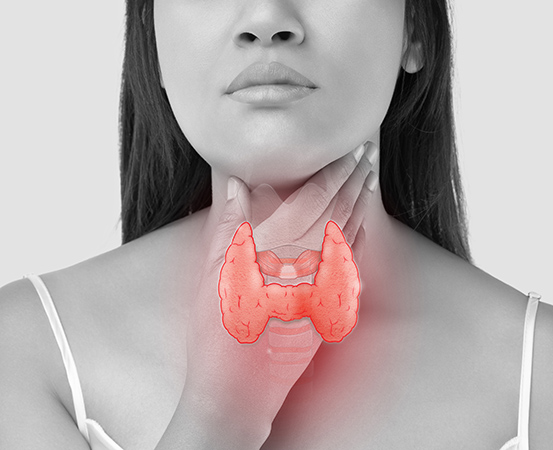
The thyroid gland, located at the front of the neck produces two hormones – triiodothyronine (T3) and thyroxine (T4). They are responsible for regulating many functions in the body including energy, temperature, weight, brain development and so on.
Experts say women are more likely to develop fluctuations of the thyroid hormones. Thyroid disorders are often triggered by autoimmune responses in which the body’s immune system starts to attack healthy cells. “And such autoimmune conditions are more commonly seen in women,” says Dr Shefali Tyagi, consultant – obstetrics and gynaecology, Motherhood Hospitals, Bengaluru.
READ MORE:
Crush Cushing’s syndrome with timely treatment
Why smells can overpower pregnant women
Plan your pregnancy course with amniocentesis
Preterm labour: signs to watch out for
Our bodies have thousands of antibodies which are designed to fight against bacteria, viruses and other antigens. “There are cases where our immunity is working against the antibodies; they are called autoimmune disorders. Thyroid disorders are among them,” says Dr Kalyan Chakravarthy, consultant endocrinology at Citizens Speciality Hospital, Hyderabad.
The article, The Prevalence of Autoimmune Disorders in Women: A Narrative Review, published in the journal, Cureus, points out the possible reasons why autoimmune disorders are more common in women.
The article states that ‘the larger number of genes originating from the X chromosome creates a far greater possibility of a larger number of mutations occurring. This puts women at a greater risk for the development of autoimmune diseases solely due to women having two X chromosomes, whereas men possess only one. The presence of two X chromosomes essentially creates a ‘double dose’ of genes present on the X chromosome and because of this, predisposes the female to autoimmunity.’
In women, age can also lead to fluctuations in thyroid hormones. “As they (women) grow older, the thyroid (function) tends to slow down,” says Dr Tyagi, adding that changing medications could also alter the level of the hormones.
Rare causes of thyroid fluctuations include surgery or removal of thyroid glands and radiation in the neck or chest.
What happens to the body when thyroid hormones fluctuate?
Hypothyroidism and hyperthyroidism are the two conditions that can arise because of the instabilities of the hormones.
“A dysfunctional thyroid gland can cause fluctuations in women’s body weight, as it is intimately connected to metabolic functions and calorie consumption,” points out Dr Tyagi.
Women who have hypothyroidism typically experience weight gain as the thyroid gland is underactive. An underactive thyroid gland leads to a fall in the basal metabolic rate or BMR (the total number of calories that the body requires to perform life-sustaining functions); this is what causes weight gain. It is also comparatively difficult to lose weight with hypothyroidism.
“Lethargy, tiredness and fatigue are some symptoms that come along with this condition,” informs Dr Tyagi. “These symptoms develop slowly in your body and take time to be visible. It starts with fatigue and weight gain; metabolism continues to become slower. Other signs and symptoms of hypothyroidism may include increased sensitivity to cold weather, dry skin, puffy face, constipation, weak muscles, increased blood cholesterol level, muscle aches, tenderness and stiffness, swelling in your joints, thinning hairline and enlarged thyroid gland (goitre),” she adds.
“In the case of hyperthyroidism, the production of hormones is more than usual from the thyroid gland. The BMR increases which leads to weight loss,” says Dr Chakravarthy. “It also causes frequent bowel motions, irregular periods and an increased heart rate,”
Dr Tyagi says thyroid hormone fluctuations can affect women’s reproductive system; women can experience very light or heavy periods due to fluctuations in the thyroid hormone.
“Once a person is on prescribed medicines and the hormone level is optimal, then the period flow be will regular,” says Dr Chakravarthy. But he is quick to point out that not everyone during puberty will have thyroid fluctuations. “Moreover, puberty doesn’t cause thyroid disorders, it just triggers the underlying condition in them.”
Hormonal fluctuations can affect ovulation too. “An overactive or underactive thyroid can prevent ovulation. Ovaries are at a high risk of developing cysts in case of an underactive thyroid,” says Dr Tyagi. He also notes that thyroid hormone fluctuations are also common in women who are at the stage of menopause where the hormone levels are drastically changing.
Other issues
“Hashimoto’s thyroiditis (an autoimmune condition that affects thyroid cells), Graves’ disease (an immune system disorder that leads to overproduction of thyroid hormone) and thyroid nodules (the lumps that form within the thyroid) are some of the other common health conditions associated with a thyroid disorder,” adds Dr Tyagi.
Why are thyroid hormones essential during pregnancy?
“In a pregnant woman, deficiency of thyroid hormone can increase the risk of miscarriages, preterm delivery, stillbirth and postpartum haemorrhage. While an overactive thyroid can cause severe morning sickness,” adds Dr Tyagi.
Dr Chakravarthy advises women to get their thyroid function checked before they get pregnant.
“Those with hypothyroidism should get their thyroid levels checked before they plan (the pregnancy) and recheck after they conceive. The foetus requires the mother’s thyroid hormone in excess quantities for the development of the brain and other internal organs. After three to four months, the foetus forms its thyroid gland and is not dependent on the mother,” adds Dr Chakravarthy. “Therefore, it is important to maintain thyroid at the right level, especially in the first three months.”
Managing the hormone fluctuations
The most common way to manage the fluctuations of thyroid hormones is through medications that will help keep the hormones under control. “Other than medications, basic lifestyle and dietary changes too can have a positive effect. Adding iodine-rich food to the diet and taking physical fitness seriously will also help manage thyroid fluctuations,” says Dr Tyagi.
Dr Chakravarthy says that thyroid disorders can’t be avoided. “It also depends on family history (genetics). A healthy lifestyle will help to some extent, but it does not ensure the prevention of thyroid issues. Taking medicines prescribed by doctors will help prevent further fluctuations.”

















